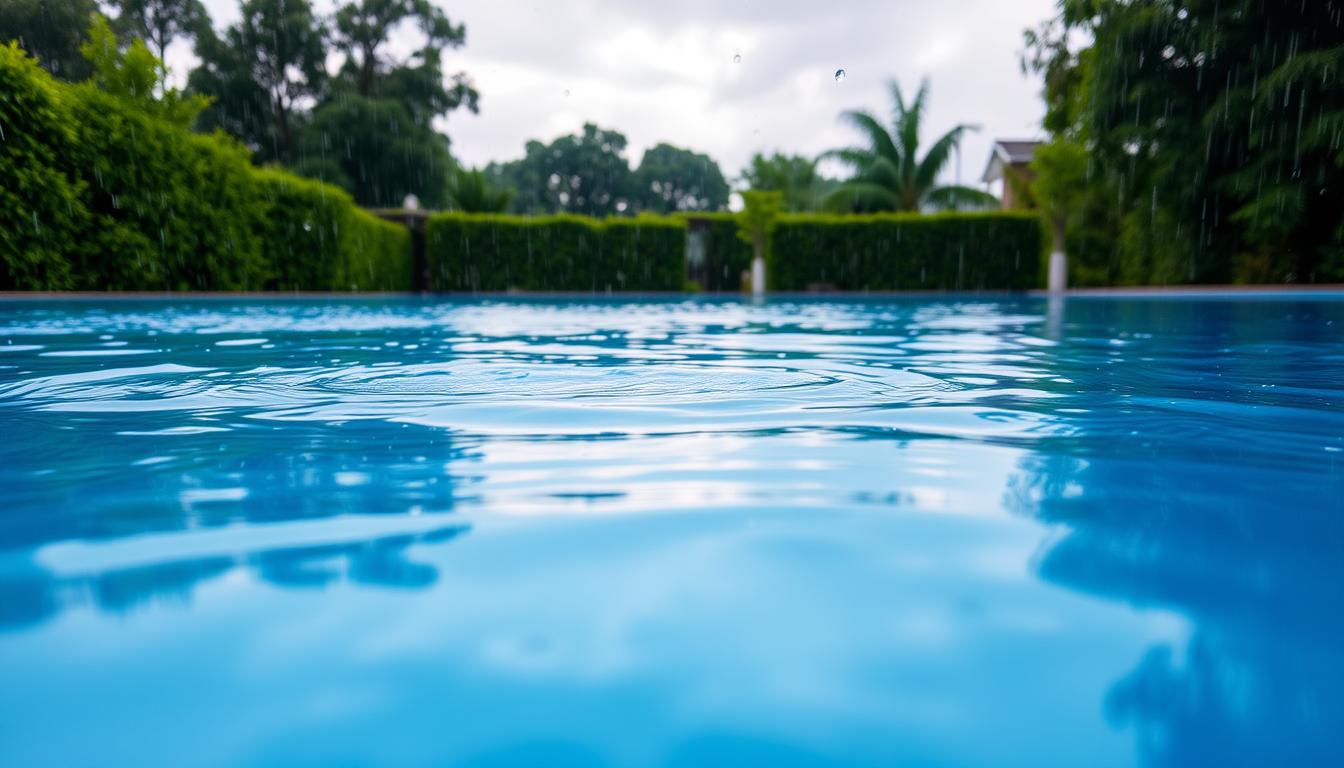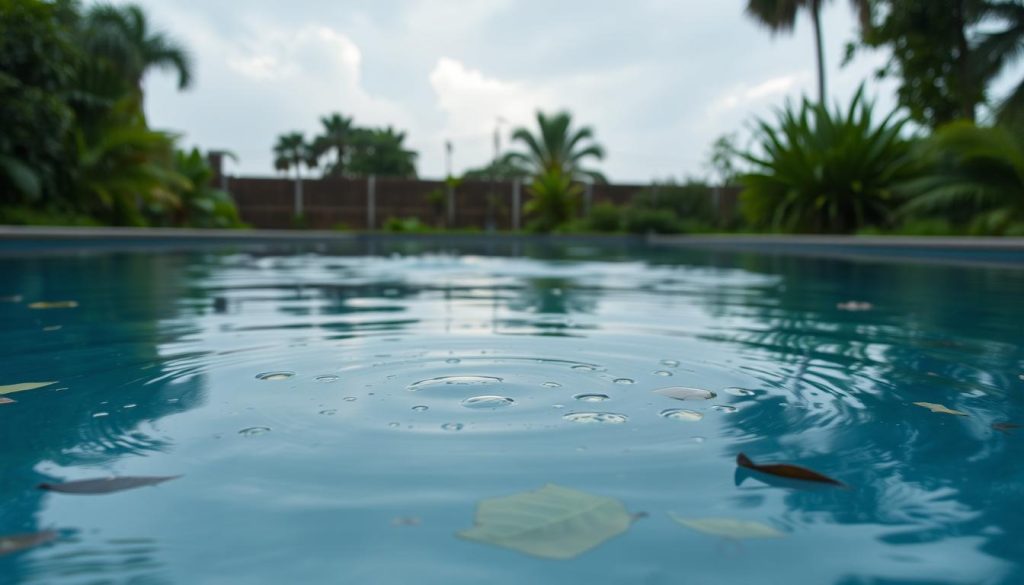
An inch of rain adds only 1.5% to a typical 50,000-liter pool. But rain can greatly impact pool water chemistry. Let’s explore how rain affects pools and ways to manage these changes.
Rainwater in the US has an average pH of 5.0. This is more acidic than the ideal pool pH of 7.2-7.6. Heavy rain can lower your pool’s pH levels, causing water balance issues.
Rain also has zero hardness. It can reduce your pool’s calcium hardness through dilution. These changes can affect your pool’s health and looks.
Rain brings contaminants like algae spores, debris, dirt, and soil into pools. These pollutants can harm water quality and clarity. It’s vital to keep your pool water balanced and clean.
Understanding rain’s effects helps us maintain safe, clean pools. Good pool management ensures enjoyable swimming for everyone.
How Rain Affects Pool Water Chemistry
Rain can greatly impact your pool’s water chemistry. It dilutes chemicals, brings in contaminants, and changes pH levels. Keeping your pool clean and safe requires understanding these effects.
Rain can alter alkalinity, pH, calcium hardness, and chlorine levels. Heavy rainfall can increase water volume by 1.5%. This can cause alkalinity to drop 5-10 ppm daily.

Dilution of Chemical Levels
Rain dilutes most pool chemicals. This includes alkalinity, pH, calcium hardness, and chlorine. However, dilution isn’t usually a big issue unless there’s heavy rainfall.
Rainwater has zero alkalinity. Heavy rains can lower your pool’s alkalinity level. This can cause it to fall by 5-10 ppm per day.
Introduction of Contaminants and Debris
Rain can bring algae spores and debris to your pool. Runoff from landscapes can add dirt and organic matter. These contaminants react with chlorine, reducing its active level.
Changes in pH and Alkalinity
US rainwater is acidic, with an average pH of 5.0. This is lower than the ideal pool pH of 7.2 to 7.8. Heavy rain can lower your pool’s pH levels.
Rainwater has almost no alkalinity. Heavy rains will dilute your pool’s alkalinity level. This can cause it to drop by 5-10 ppm daily.
| Location | Average Rainwater pH | Ideal Pool Water pH Range |
|---|---|---|
| United States | 5.0 | 7.2 – 7.8 |
| DFW Area | 4.5 – 5.5 | 7.2 – 7.8 |
Impact on Calcium Hardness
Rainwater has zero hardness. It can lower your pool’s calcium hardness through dilution. Soft pool water may need calcium added after heavy rain.
Hard pool water might benefit from rainwater dilution. This could lower the hardness to a better range.
Reduction of Chlorine Levels
Rain dilutes your pool’s chlorine concentration. Added water volume lowers chlorine levels. Contaminants from rain also use up chlorine as they enter.
After heavy rainfall, you may need to shock your pool. This raises chlorine levels and addresses increased chlorine demand from contaminants.
Testing your pool water regularly, especially after heavy rainfall, is essential for maintaining proper water chemistry and ensuring a safe, enjoyable swimming experience.
Managing the Effects of Rain on Your Pool Water
Heavy rainfall can impact your pool water chemistry. It may create conditions for algae growth by adding nutrients and contaminants. Rain can also dilute chemical levels, especially chlorine, which keeps your pool clean.
Take action after heavy rain to maintain water quality. Run your pool filtration system for at least 24 hours. This helps circulate water and remove debris introduced by rain.
Consider adding algaecide to protect against algae blooms. Regular brushing of pool walls and floor helps prevent algae from taking hold.
Potential for Algae Growth
If your pool turns green after rain, use copper-based algaecide with chlorine shock. Keep the filtration system running continuously. Brush the pool walls and floor to remove algae particles.
Effects on Salt Levels in Saltwater Pools
Heavy rainfall can dilute salt levels in saltwater pools. Test your pool’s salt levels after significant rain. Add salt as needed to maintain the proper concentration for your chlorination system.
High salt levels can be reduced by rainfall. Fresh rainwater helps dilute excess salt in your pool.
| Parameter | Ideal Range | Effect of Rain |
|---|---|---|
| pH | 7.2 – 7.6 | Lowered by acidic rainwater |
| Chlorine | 1 – 3 ppm | Diluted, leading to decreased sanitizing power |
| Alkalinity | 100 – 150 ppm | Reduced, affecting pH stability |
| Calcium Hardness | 180 – 220 ppm | Decreased, potentially causing corrosion |
| Salt (for saltwater pools) | 2700 – 3400 ppm | Diluted, requiring addition of salt |
Importance of Maintaining Proper Water Chemistry
Test and adjust your pool water regularly, especially after heavy rain. Check water levels and drain excess to keep skimmers working properly. Test pH, alkalinity, and chlorine levels.
Add chemicals as needed to balance water chemistry. Shock the pool to oxidize contaminants and restore chlorine levels. Brush and vacuum your pool to remove debris.
Clean skimmer and pump baskets to maintain good circulation. Proper maintenance ensures a safe and enjoyable swimming experience, even after heavy rainfall.
Conclusion
Rain can significantly affect pool water. It dilutes chemicals, introduces contaminants, and alters pH and alkalinity levels. Pool owners must understand these effects and take action to maintain a healthy swimming environment.
Regular water testing is crucial, especially after heavy rainfall. This helps identify and address chemical imbalances quickly. Proactive steps are key to keeping your pool safe and enjoyable.
To minimize rain’s impact, implement effective pool maintenance tips. Run your filtration system to remove impurities. Skim debris from the surface. Add necessary chemicals to restore balance.
Shock treatment after heavy rain can eliminate contaminants and prevent algae growth. Increasing filtration and circulation can also improve water quality. These steps help maintain a clean pool.
Stay vigilant in your pool care routine. Regular maintenance ensures your pool remains a safe outdoor oasis. Test, adjust chemistry, and clean consistently to enjoy your pool all season long.







